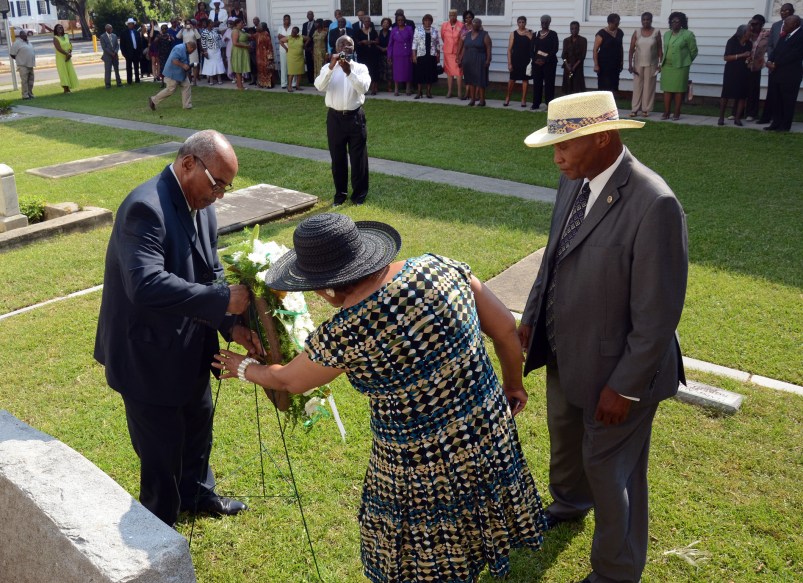COLUMBIA, S.C. (AP) — Blacks in South Carolina who served in the Confederate military, many of them slaves pressed into duty, would be recognized with a Statehouse monument under a proposal by two white Republican lawmakers.
State Reps. Bill Chumley and Mike Burns said Monday they want to recognize African-Americans whose courage has been purposely discounted in history books. They point out that hundreds of black South Carolinians applied for state-provided Confederate pensions.
“It’s a good time to honor people forgotten in this,” Chumley said. “We have a real good chance to unify people.”
But state Sen. Darrell Jackson said the proposal would “open up wounds,” not bring people together.
Both Chumley and Burns voted against removing the Confederate flag from Statehouse grounds in 2015 after a white supremacist gunned down nine parishioners in a historic black church in Charleston. Burns said his vote reflected his accurate prediction that the move would cascade into stripping Civil War-era symbols from other U.S. communities.
While some see the flags and monuments as hated symbols of racism and slavery, others see proud reminders of Southern heritage and ancestors who fought in the war. The national debate has even sparked violence like that around a white supremacist rally in August in Charlottesville, Virginia.
“This is an effort to hopefully end all this foolishness,” Burns said. South Carolina can set a national example, he said, “if we can successfully mitigate all this monument stuff and come together with something common we can honor.”
Exact numbers of black Confederates are unknown. The applications of more than 300 black residents who sought the $25 annual pension allotted under a 1923 law — $357 in today’s dollars — are preserved at the state Department of Archives and History. Eligible black pensioners had to serve in a South Carolina regiment at least six months. Their pensions were far less than white veterans and widows received.
While incomplete, the archives show most black Confederates were slaves given no choice but to serve the Confederacy as cooks, laborers and personal attendees. It’s unclear how many served as soldiers.
Veterans include Walter Curry’s great-great-great grandmother, Lavinia Thompson, a cook in the Confederacy from 1863 — when she was 19 — until the war’s end in 1865.
Curry, who lives in Columbia, said he was shocked to learn of her service but hopes for the recognition.
“I was taught black soldiers only fought for the Union. I kind of experienced a cognitive dissonance,” Curry said. “Black Confederates have been overlooked because some people will say they were fighting on the wrong side. That’s not true. Some had no choice in the matter. Some did. Some fought because they wanted to fight for their home state. That’s sacrifice.”
He added that he’s proud of all blacks who served, regardless of which side. Among them, he noted, was Henry “Dad” Brown, a free black who joined the Confederacy in 1861 as a drummer.
House Minority Leader Todd Rutherford said his colleagues’ proposal needs to also recognize black Union veterans as well as slaves who led revolts.
“It’s a great start. … It’s just too narrow to truly recognize what our state and nation went through,” said Rutherford, a Democrat, who is black.
Jackson, a black Democrat, and Sen. Greg Gregory, a white Republican, last month announced their proposal to memorialize Robert Smalls with the first monument on Statehouse grounds to honor an individual African-American. In 1862, Smalls hijacked a Confederate supply ship he worked on, steered his family to freedom and delivered the ammunition-laden vessel to the Union. He went on to become a state legislator and five-term congressman.
Burns and Chumley say their proposal is unrelated to Jackson’s.
But Jackson said he fears it could become a “poison pill” to derail the Smalls monument, or at the very least “extend the debate beyond what we want it to be.”
“I’m disappointed,” he said. “Our proposal is biracial and bipartisan, and it’s intended to bring people together around a heroic figure who deserves his place among the Statehouse alone.”







Nothing is too low or too shameful for the White Dixiecrats, who were staunch Democrats out of pure spite for a century, and who are all now Republicans because a Democrat President passed the Civil Rights and Voting Rights Acts.
Last time this black confederates fought for south rightwing nut job trope was in news Eric Foner wrote that there is no evidence whatsoever that any slaves actually fought- you know with guns, so called arms- for the csa. Sorry no link.
Poisonous loser treasonous revanchism dies hard
This has nothing to do with honoring black Confederate soldiers and everything to do about trying to draw a false equivalency between an oppressive force and those forced to serve within it. It’s a smug stunt to further the bullshit narrative that it’s all about “heritage”. It’s the monument building equivalent to the “I’m not racist, I have black friends!” line.
Yes, because this was the legacy of the black man in South Carolina during the Confederacy: a soldier in the Confederate Army.
It is ALWAYS about Cleek’s Law. Always, always, always.
Fuck all of those un-American, racist assholes.
Were there a Just God, there would be a lot of smoking holes in the ground where each of those motherfuckers formerly stood.